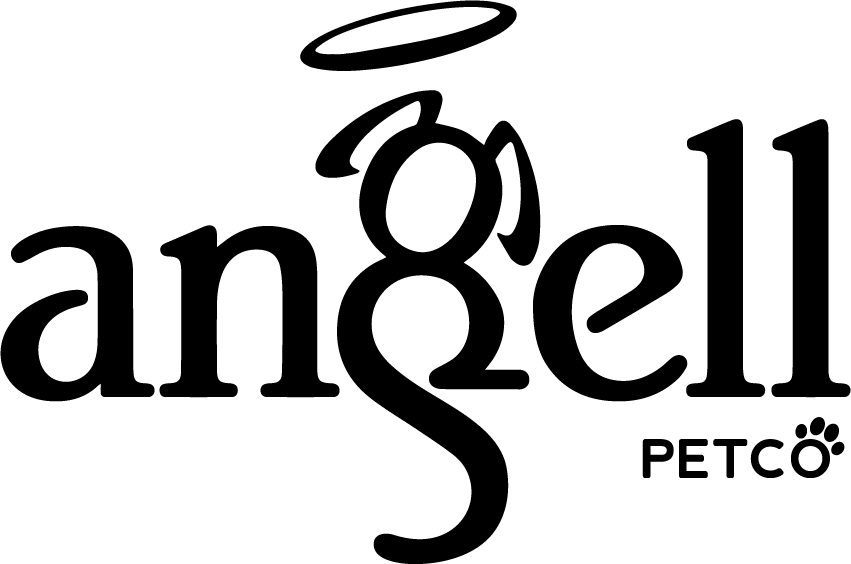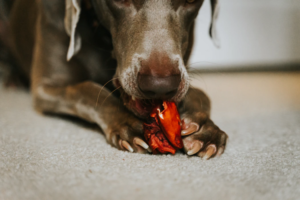Many foods are toxic to dogs. Some are obvious –– like chocolate and onions –– others are easier to confuse with a healthy, balanced dog treat. We’ve also included a few non-food items in this list that dogs should be kept away from.
Scan our toxic food for dogs list below for an instant overview or click on any item for more detailed information and, in some cases, suitable alternatives.
Toxic food for dogs:
- Alcoholic beverages
- Chocolate
- Cooked bones
- Onions
- Grapes
- Garlic
- Chewing gum
- Avocado
- Salt
- Nuts
- Dairy
- Apple pips
- Raw fish
- Coffee
- Corn on the cob
- Plants
- Human medicine
- Citrus
- Food with additives, preservatives and nasty extras
Alcoholic Beverages
Although not technically a food, we’re kicking off our list with an item that most people have around the house. Dogs have no use for alcohol and the substance should never be given to pets under any circumstances. Alcohol has a similar, unnerving effect on dogs as it does humans, causing intoxication, vomiting, disorientation, high body temperature and panting. It can also cause seizures and collapse, if not treated. Needless to say, keep a watchful eye at any family parties and wipe up spillages as soon as they happen.
Chocolate
It’s true, our pups don’t get to eat the sinful snacks we enjoy on a Friday night. Luckily, they don’t mind as they’d prefer to nibble on their own healthy dog treats. As well as your glass of wine, you’ll need to refrain from sharing any chocolate with your pooch. Theobromine, contained in chocolate, is toxic to dogs and — depending on the size of your dog and the portion of chocolate consumed — can cause serious damage. If your dog does accidentally devour some chocolate before you realise, you’ll need to take them to the vet as a precaution and log how many grams of chocolate they consumed. Don’t wait to seek veterinary attention as chocolate poisoning develops in dogs at least six hours after consumption. Because of this delay, there is no way to assume that your dog is okay.
Cooked Bones
We’re placing this item high up on the list as it confuses most newbie dog owners. Surely all bones are fine for dogs? This is not the case. While dogs will love to gnaw on bones, they should never be fed bones that could splinter and cause a blockage or internal injury. It doesn’t matter which breed of dog you own or how “strong” you think their jaw is, cooked bones are forbidden because of their ability to splinter into small pieces during digestion. If you are going to feed your dog bones, they should be raw.
Onions
Onions are a no-no when it comes to dogs. All parts of onion, from its flesh to its juice, are highly toxic to dogs. Even processed onion powder has the same effect. While onions are a common, cheap and nutritious ingredient in most human meals, they should certainly never enter a dog’s diet. Aside from the alpha issues that sharing food with your dog brings, this is one of the key reasons why feeding dogs “human” food is not a good idea. You’ll want to make this a strict family rule from the beginning to ensure nobody is sneaking your dog any food while you’re not looking. If this is happening, the chances of your dog consuming onions are high. Remember, dogs need a tailored, canine diet that is suited to their needs. They don’t need a nibble of your pizza, a cheeky chip or two or any other human treat to keep them happy.
Grapes
Dogs do enjoy fruit as a low-fat snack and as part of improvised training treat. However, grapes shouldn’t be one of these snacks. Don’t be tempted by the convenient size of grapes, as they are highly toxic to dogs. Both peeled and unpeeled grapes cause grape toxicity leading to symptoms like lethargy and abdomen tenderness. Raisins also produce the same effect. So, stick to safe fruits such as blueberries, oranges and pears (so long as you peel and remove any seeds). Better yet, buy healthy training treats that you can trust.
Garlic
Garlic is poisonous to most pets, including dogs. While you might love the additional flavour that a few cloves of garlic bring to a meal, dogs won’t enjoy this benefit. The intensity of garlic makes this ingredient worse than other vegetables in the Allium family, including onions, chives and leeks. Garlic consumption can cause multiple side effects including damage to red blood cells, gastrointestinal upset, lethargy, pale gums, increased heart rate, increased respiratory rate, weakness, exercise intolerance and collapse.
Chewing Gum
Next, an item that you’ll need to be wary of on walks to make sure your pup doesn’t accidentally pick up a piece of discarded gum. Chewing gum should never be swallowed but, of course, dogs don’t know this. For this reason, you’ll need to steer clear of gum to prevent blockages. However, accidents do happen so be sure to learn how to perform the Heimlich Manoeuvre on a dog before buying a puppy. Already got a dog? You can learn the process now. Gum is also bad for dogs in that it can contain Xylito, which can cause liver failure. Xylitol is a sugar substitute also found in sweets, toothpaste, mouthwash and non-natural peanut butter.
Avocado
It might be the trendiest thing to put on your breakfast plate but it shouldn’t be on your dog’s. Avocado isn’t technically safe for dogs to eat as it contains persin, a toxin that causes serious illness –– and sometimes death –– in canines. If the small amount of persin doesn’t put you off, the high-fat content of avocados should. Amongst weight gain, calorie-dense foods can lead to pancreatitis and gastrointestinal upset in dogs. To top it off, the unusually large avocado seed is a serious choking hazard.
Salt
Although salt, in moderation, isn’t toxic to dogs, too much salt is never a good thing. Feeding your dog highly salty foods like beef jerky will leave them thirsty and could lead to vomiting, diarrhoea and high temperatures. Instead, switch it up and feed them a pig’s ear treat. With a similar crunchy texture, this treat acts as a natural toothbrush and provides them with plenty of succulent, gnawing time in the process.
Nuts
Not all nuts are bad for dogs but quite a few of them are. Avoid almonds, walnuts, macadamia nuts, pecans, pistachios and hickory nuts. Opt for peanuts, cashews or hazelnuts but be aware of potential allergies and high-fat content. Nuts can be given on occasion but they shouldn’t be given on a daily basis. Feeding your dog alternative protein-filled snacks such as Irish beef patties ensures they receive adequate protein, B vitamins, Zinc and Iron without the high-fat trade-off.
Dairy
Although not technically toxic for dogs, dairy products aren’t recommended. Avoid feeding your dog milk, frequent portions of cheese or things infused with butter as pets don’t break down lactose in the same way humans do.
Apple Pips
Apples are a great, natural crunchy treat for dogs –– especially smothered in peanut butter (remember, it must be the all-natural kind). Giving your dog a few apple slices will give them a boost of vitamin A, vitamin C and dietary fibre. However, the core and pips (or apple seeds) should be removed. Apple pips contain a small amount of cyanide, which can be released into the body if chewed. Simply swallowing a few pips shouldn’t hurt your pup, yet you shouldn’t take any chances. The same goes for apricot, peach and cherry pits, which contain amygdalin and can pose a choking hazard.
Raw Fish
In general, fish is recommended for dogs. Indeed, most of our food blends contain some form of fish, as do all of our natural fish treats. Fish is a great source of protein and Omega-3 fatty acids, benefitting both puppies and mature dogs. However, raw fish is dangerous to dogs as it can contain parasites. Parasites can cause fish disease such as salmon poisoning, which can be fatal. Vomiting, suppressed appetite and swollen lymph nodes are all symptoms. Parasites don’t just come from exotic fish, they’re found in common fish species such as salmon and trout.
Coffee
Caffeine might give us a subtle hit of energy but, for your dog, the effects are much more severe. Small dogs, in particular, are at risk of developing caffeine poisoning shortly after consuming coffee beans or ground coffee. Since it’s the caffeine that dogs can’t stomach, it’s not just cappuccinos that you should be careful of. Energy drinks, diet pills, tea and some fizzy drinks also contain caffeine and should be kept away from dogs. If you’re dealing with the likes of a Great Dane, this might mean storing your brewing equipment on a high shelf. Otherwise, you’ll just need to remember to put coffee securely away after use.
Corn on the Cob
Corn is a confusing ingredient that is sometimes safe for dogs to eat and other times not. One thing is for sure, you should never give your dog corn on the cob, even if you want to include them in a family barbecue. The sheer size of corn on the cob can cause internal blockages. However, other variations of corn are used in dog food formulas as a type of grain and can be completely okay for your dog to consume. That said, you’ll need to be aware of whether your dog has any grain-related allergies. If they do, you’ll want to opt for a hypoallergenic food alternative that is gentler on their digestion.
Plants
Plants don’t normally come to mind when thinking about toxic food for dogs. However, there are a variety of poisonous plants that dogs may mistake for food while roaming around the garden. Dogs Trust has a nine-page factsheet on this topic to help you cross-check your garden. Puppy proofing your garden and home should be one of the first things you focus on as a new dog owner. Why? You might innocently have substances in your backyard that can upset your dog. Poisonous plants can cause standalone diarrhoea and, in some cases, they can also be fatal.
Human Medicine
This is another non-food item that is incredibly important to note. Prescription medicine and over the counter pills that can ease our pain will not work for dogs in the same way. Never give your dog medicine from your cabinet as even common pain relievers and cold medicine can be deadly to your dog. If you think your dog requires medication, you should go to a vet who can prescribe the correct dosage and drug.
Citrus
Citrus –– usually found in the peel of a fruit –– contains citric acid that can cause irritation in your dog. This is why fruits should be served peeled as well as without seeds. For the same reason, avoid leaving the zest of a lemon or orange peels in an accessible place and be careful where you keep your composting.
Foods with Additives, Preservatives and Nasty Extras
This isn’t about an item of food but rather what is commonly added to food. Feeding dogs sub-par food blends with non-nutritional fillers, additives and preservatives mean that your dog won’t receive optimum nutrition. An optimal diet includes 100% natural ingredients with a healthy balance between protein, fats and carbohydrates. These raw ingredients should be gently cooked to retain the maximum amount of minerals and vitamins. This is the easiest mistake to make on this list since mass-produced dog food blends are often sold with added extras inside as standard.
So, how can you avoid the trap of filling your dog with junk?
Buy food from suppliers that focus on all-natural ingredients with transparent disclaimers about a food blend’s ingredients.
At Angell PetCo we do just that. You can view any of our food blends and instantly see what’s inside. We’ll tell you whether items are fresh and what ingredients are used to empower you to make the right decision for your dog.
All of our blends are hypoallergenic and cooked in small batches at low temperatures to preserve as much natural goodness as possible. When you buy from us, you know exactly what you’re feeding your dog and that it’s full of those all-important vitamins and minerals.
We know it can be tempting to buy low-grade dog food when you’re running low, especially if it’s all that’s instantly accessible in your nearest pet store. That’s why we offer a subscription service so you’ll never run out of premium, dog food.


